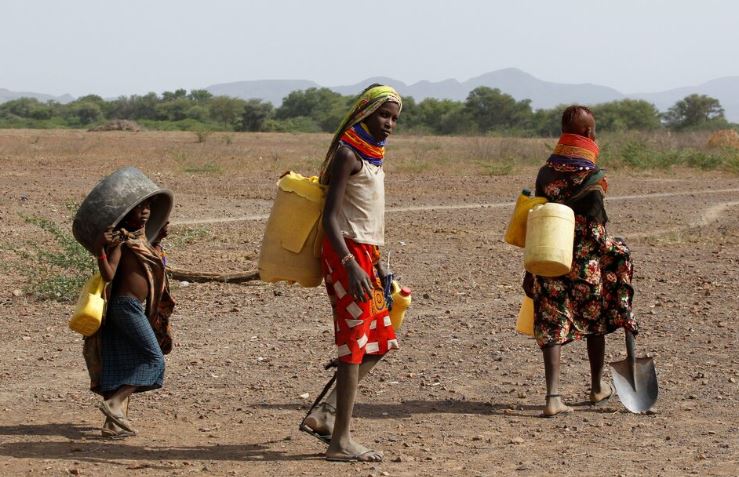Kenya among 16 global hunger hotspots facing crisis, UN warns

Conflict and violence are the main drivers of hunger in 14 of the 16 hotspots, while economic shocks and extreme weather make conditions worse.
Millions of people across 16 countries are facing the risk of famine, as conflict, economic shocks, and extreme weather push hunger to critical levels, the United Nations has warned.
A joint report by the Food and Agriculture Organisation and the World Food Programme says that without urgent funding and unrestricted humanitarian access, the window to prevent widespread starvation is closing rapidly.
More To Read
- UN warns 7.5 million South Sudanese at risk of severe hunger
- WFP warns Sudan aid at risk after expulsion of top officials amid worsening hunger
- Why are over 670 million people going hungry?
- Kenya ranked 103 globally with serious hunger levels, as 20 million people remain undernourished
- 95 people died from hunger, disease in Western Sudan's refugee camp during past 40 days: Volunteers
- Africa risks becoming global hunger epicentre by 2030 if reforms are not put in place, report warns
Kenya is one of the 16 hunger hotspots identified in the report, alongside countries such as Haiti, Mali, Palestine, South Sudan, Sudan, Yemen, Afghanistan, the Democratic Republic of the Congo, Myanmar, Nigeria, Somalia, Syria, Burkina Faso, Chad, and the Rohingya refugee population in Bangladesh.
In Kenya, drought and rising food prices are worsening already fragile livelihoods, leaving families struggling to meet basic needs.
Conflict and violence are the main drivers of hunger in 14 of the 16 hotspots, while economic shocks and extreme weather make conditions worse.
The report identifies six countries and territories of highest concern, including Haiti, Mali, Palestine, South Sudan, Sudan, and Yemen, where populations face an imminent risk of catastrophic hunger.
Another six countries, including Afghanistan, the Democratic Republic of the Congo, Myanmar, Nigeria, Somalia, and Syria, are classified as of very high concern. The remaining four hotspots, including Burkina Faso, Chad, Kenya, and the Rohingya refugees in Bangladesh, also face severe food insecurity.
Household food production and incomes remain insufficient to meet basic needs, leaving millions dependent on emergency aid.
Funding for lifesaving aid is critically low. As of the end of October 2025, only 10.5 billion dollars (approximately Sh1.35 trillion) of the 29 billion dollars (approximately Sh3.75 trillion) needed to assist the people most at risk had been received.
The shortfalls have forced significant cuts to food rations, suspensions of school feeding and nutrition programmes, and reductions in support for refugees and displaced families. The World Food Programme has tightened its targeting criteria, leaving millions more vulnerable.
The report also warns that the lack of funding is undermining efforts to protect agricultural livelihoods, including the provision of seeds, livestock support, and preparatory agricultural programmes. Without urgent investment, these measures will not reach communities before planting seasons or new shocks occur, increasing the risk of future crises.
“The world’s early warning systems work – this is fundamental for early action. We must move from reacting to crises to preventing them. Investing in livelihoods, resilience and social protection before hunger peaks will save lives and resources. Famine prevention is not just a moral duty - it is a smart investment in long-term peace and stability. Peace is a prerequisite for food security, and the right to food is a basic human right,” said FAO Director-General QU Dongyu.
FAO and WFP stress that famine is almost always predictable and preventable. Together, they call on the international community to urgently refocus global attention on famine prevention and scale up investments in long-term food security and resilience.
The organisations urge governments, donors, and partners to heed the warnings of the Integrated Food Security Phase Classification and the Cadre Harmonisé system, act before conditions reach catastrophic thresholds, and scale up investments in long-term food security and resilience.
They stress that anticipatory action is far more cost-effective than delayed responses, and millions of lives depend on decisive global action now.
“We are on the brink of a completely preventable hunger catastrophe that threatens widespread starvation in multiple countries,” said WFP Executive Director Cindy McCain.
“Mothers are skipping meals so their children can eat, and families are exhausting what little they have left as they struggle to survive. We urgently need new funding and unimpeded access – a failure to act now will only drive further instability, migration, and conflict.”
Top Stories Today















































